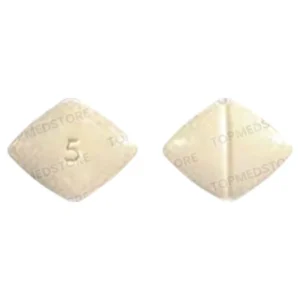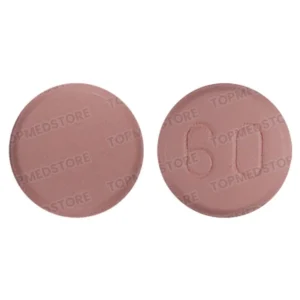Description
Active Ingredient
The active ingredient in this medication is Acarbose, which is a pseudo tetrasaccharide and inhibitor of alpha-glucosidase and pancreatic alpha-amylase with antihyperglycemic activity. This component binds to and inhibits alpha-glucosidase, an enteric enzyme found in the brush border of the small intestines that hydrolyzes oligosaccharides and disaccharides into glucose and other monosaccharides. It also prevents the breakdown of larger carbohydrates into glucose and decreases the rise in postprandial blood glucose levels. This drug inhibits pancreatic alpha-amylase which hydrolyzes complex starches to oligosaccharides in the small intestines.
Indications
Acarbose-composed Precose is used with a proper diet and exercise program to control high blood sugar in people with type 2 diabetes. Controlling high blood sugar helps prevent kidney damage, blindness, nerve problems, loss of limbs, and sexual function problems. Proper control of diabetes may also lessen your risk of a heart attack or stroke. It slows the breakdown and absorption of carbohydrates from foods that you eat. This effect helps lessen your blood sugar rise after a meal.
Side Effects
- Stomach Discomfort
- Mild Diarrhea
- Mild Skin Rash
Action Mechanism
The cells lining the small intestine then release alpha-glucosidase enzymes that further digest the oligosaccharides into smaller sugars, like glucose, that can be absorbed. Precose is a man-made oligosaccharide designed to slow down the actions of alpha-amylase and alpha-glucosidase enzymes, thereby slowing the appearance of sugar in the blood after a meal.
Dosages
This effective medicine is available for oral consumption and in dosage as mentioned below:
- 25 mg: It shall be taken exactly as directed by the doctor, usually 3 times daily with the first bite of a meal
- 50 mg: It is to be consumed 3 times a day as prescribed by the doctor
- 100 mg: It is advisable to consume with the first bite of the meal as directed by the doctor
Note
You should not take this medicine if you have inflammatory bowel disease, an ulcer or blockage in your intestines, or cirrhosis of the liver.
FAQs
What is Precose?
Precose is a medication that belongs to a class of drugs called alpha-glucosidase inhibitors. Its active ingredient is acarbose. It’s commonly prescribed to help manage type 2 diabetes mellitus.
How does Precose work?
Precose works by slowing down the digestion of carbohydrates in the intestine. Normally, carbohydrates are broken down into simple sugars (glucose) during digestion, which are then absorbed into the bloodstream. Precose inhibits the action of certain enzymes in the intestine that are responsible for breaking down carbohydrates, delaying the absorption of glucose into the bloodstream. This helps to prevent spikes in blood sugar levels after meals.
What is Precose used for?
Precose is primarily used to control blood sugar levels in people with type 2 diabetes mellitus. It is often prescribed along with diet and exercise to help manage blood sugar levels, particularly after meals. By slowing down the absorption of carbohydrates, Precose can help prevent rapid spikes in blood sugar levels, which can be harmful in individuals with diabetes. It is not used to treat type 1 diabetes or diabetic ketoacidosis. Always consult your healthcare provider for appropriate usage and dosage.
Is Precose safe for people with type 1 diabetes?
Precose is not indicated for use in individuals with type 1 diabetes. It is specifically prescribed for managing high blood sugar in people with type 2 diabetes.
Can Precose cause weight gain?
Unlike some diabetes medications that may cause weight gain, Precose is not associated with weight gain. In fact, it may help with weight management by reducing the absorption of carbohydrates from food.
How long does the effect of Precose last after a meal?
The effect of Precose typically lasts for the duration of a meal and shortly afterward. It slows down the digestion and absorption of carbohydrates from the meal, thereby reducing the postprandial rise in blood sugar levels.
Can Precose be taken with other diabetes medications?
Precose can be used in combination with other diabetes medications, such as metformin or insulin, to achieve better blood sugar control. However, it’s important to follow your doctor’s recommendations regarding dosage and timing.
What should I do if I miss a dose of Precose?
If you miss a dose of Precose, take it as soon as you remember, with the next meal. On the other hand, if your next dose is almost here, skip the missed one and carry on with your regular regimen. Never take two doses to make up for something you forgot to take.
Can Precose be used during pregnancy?
The safety of Precose during pregnancy has not been well established. It’s essential to consult with your healthcare provider before taking Precose if you are pregnant or planning to become pregnant.
Does Precose cause hypoglycemia (low blood sugar)?
Unlike some diabetes medications, Precose is less likely to cause hypoglycemia when used alone. However, if taken in combination with other diabetes medications that can cause hypoglycemia, such as insulin or sulfonylureas, the risk of hypoglycemia may increase.
Can Precose be crushed or chewed?
Precose tablets should be swallowed whole with plenty of water and should not be crushed or chewed. Crushing or chewing the tablets may alter the way the medication is released in the body, affecting its effectiveness.
Is alcohol consumption safe while taking Precose?
Alcohol consumption may increase the risk of gastrointestinal side effects such as stomach discomfort and diarrhea when taken with Precose. It’s advisable to limit alcohol intake or avoid it altogether while on Precose therapy.
Can Precose be used to treat gestational diabetes?
Precose is not typically used to treat gestational diabetes, which occurs during pregnancy. Management of gestational diabetes usually involves dietary modifications, exercise, and insulin therapy under the guidance of a healthcare provider specializing in prenatal care.






Reviews
There are no reviews yet.